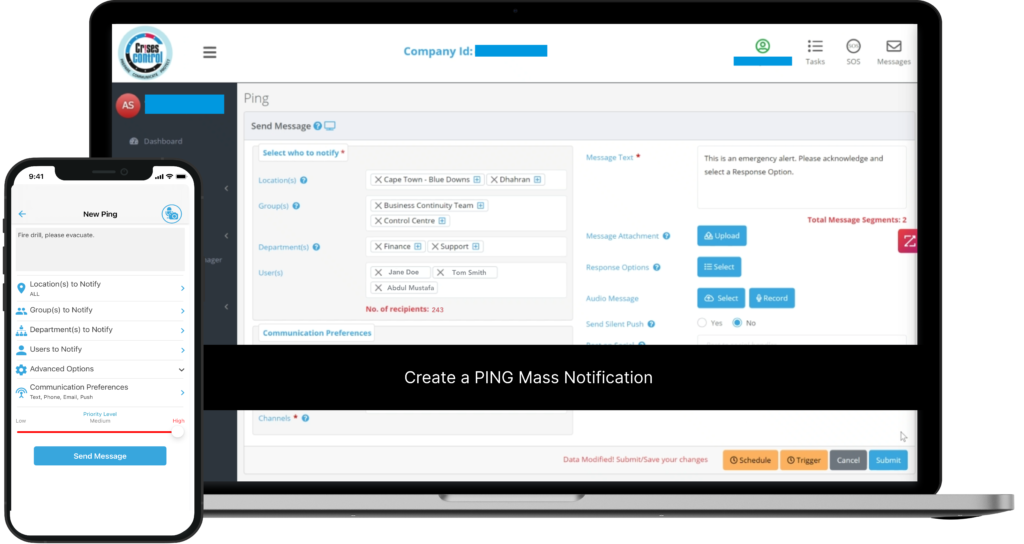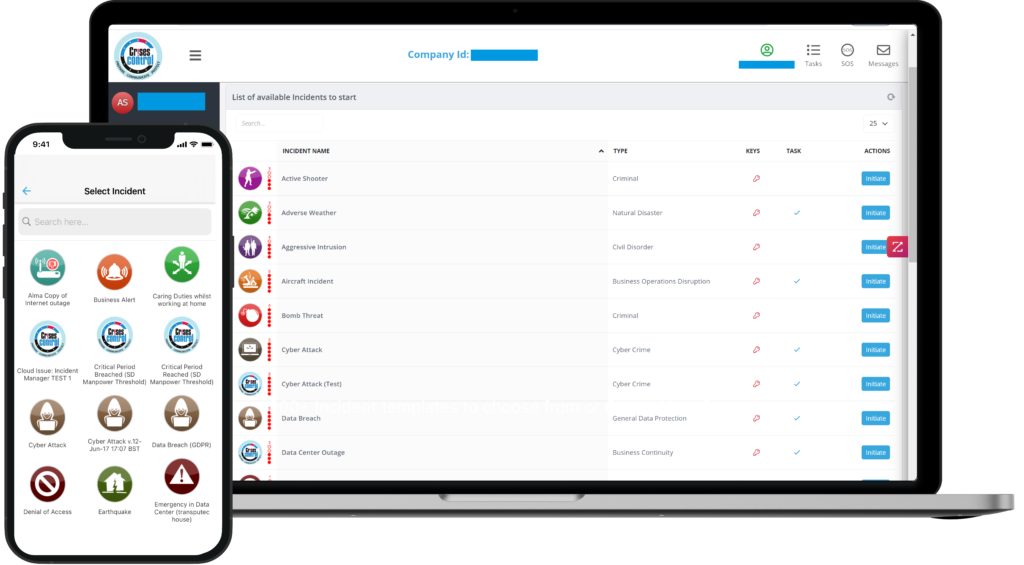Written by Anneri Fourie | Marketing Executive
In the dynamic world of aviation, ensuring seamless operations and addressing incidents efficiently are paramount. The integration of incident management software into aviation operations—from ground handling to in-flight services—can transform how incidents are managed, leading to improved safety, efficiency, and overall operational effectiveness.
This blog delves into the significance of incident management software, the specific challenges faced by the aviation sector, and how Crises Control’s solutions can effectively address these challenges.
What is Incident Management Software?
Incident management software is a comprehensive tool designed to manage and streamline the response to incidents and emergencies. It provides a centralised platform for real-time monitoring, reporting, and coordination of incidents. Key features typically include:
- Real-Time Alerts: Instant notifications about incidents and potential issues.
- Incident Reporting: Detailed logs and reports of incidents as they occur.
- Task Management: Coordination of tasks and resources to address incidents.
- Data Analytics: Analysis of incident data to improve response strategies and operational efficiency.
In essence, incident management software helps organisations swiftly and effectively handle disruptions, ensuring that issues are resolved promptly and that all relevant stakeholders are informed and involved.
Why is Incident Management Software Important for the Aviation Sector?
The aviation sector is a complex network of operations that must function smoothly to ensure passenger safety and operational efficiency. Incident management software is crucial in this sector for several reasons:
- Safety and Compliance: Aviation operations are subject to stringent safety regulations and standards. Incident management software helps ensure compliance by providing accurate and timely reporting, which is essential for audits and regulatory reviews.
- Operational Continuity: Efficient incident management helps minimise disruptions and maintain operational continuity. By quickly addressing and resolving incidents, airlines can avoid significant delays and operational setbacks.
- Enhanced Communication: Seamless communication between ground handling teams, flight crews, and other stakeholders is critical. Incident management software facilitates real-time communication and coordination, ensuring that all parties are aligned and informed.
What Challenges Does the Aviation Sector Face?
The aviation industry faces several unique challenges that can impact incident management:
- Coordination Across Multiple Teams: The need for effective coordination between ground handling staff, flight crews, maintenance teams, and air traffic control can lead to communication breakdowns and delayed responses.
- Resource Management: Managing resources efficiently during an incident, such as personnel, equipment, and aircraft, requires real-time information and swift decision-making.
- Regulatory Compliance: Adhering to safety regulations and reporting requirements involves detailed documentation and timely submission of incident reports.
- Complex Operational Environment: The aviation sector operates in a high-pressure environment where incidents can escalate quickly, requiring a robust and flexible incident management system.
How Can Incident Management Software, Like Crises Control, Help Aid with These Challenges?
Enhanced Coordination and Communication
Crises Control’s incident management software offers a unified platform for communication and coordination across all operational levels:
- Real-Time Updates: The software provides real-time alerts and updates, ensuring that all relevant parties are immediately informed of incidents and can take appropriate action.
- Integrated Communication Channels: By facilitating seamless communication between ground and in-flight teams, Crises Control helps bridge gaps and ensures a coordinated response to incidents.
Interested in our Ping Mass Notification Software?
Efficiently alert everyone in seconds at scale with our Mass Notification System – PING, get the message out fast and ensure rapid response and recovery.

Efficient Resource Management
Effective resource management is critical during incidents. Crises Control addresses this need by:
- Dynamic Task Allocation: The software allows for the efficient allocation of resources based on real-time needs, optimising the response to incidents and minimising downtime.
- Comprehensive Task Management: Crises Control’s task management features ensure that all necessary actions are tracked and completed, improving the overall response efficiency.
Regulatory Compliance and Reporting
Meeting regulatory requirements and maintaining compliance is a key aspect of incident management in aviation. Crises Control supports compliance through:
- Detailed Reporting: The software provides comprehensive incident logs and reports that facilitate accurate and timely documentation for regulatory reviews and audits.
- Automated Compliance Checks: Crises Control includes features to help ensure that all required compliance checks and procedures are followed, reducing the risk of regulatory issues.

Interested in our Incident Management Software?
Customise your Crisis Incident Management Software to meet your specific needs with our flexible tools & stay connected and informed during the crisis and incident management process
Adaptability to Complex Environments
The aviation sector’s complex operational environment requires a flexible and adaptable incident management system. Crises Control excels in this area by:
- Customisable Solutions: The software can be tailored to meet the specific needs of different operational units, including ground handling, in-flight services, and maintenance teams.
- Scalable Integration: Crises Control’s solutions are designed to scale with your organisation, adapting to evolving operational requirements and growing demands.
Crises Control Case Study: Transforming Incident Management for a Leading Ground Handling Company
To illustrate the transformative impact of Crises Control’s incident management software, let’s explore an anonymous case study involving a leading ground handling company in the aviation sector. This case study highlights how Crises Control’s solutions significantly improved incident management processes, resulting in enhanced coordination, efficiency, and safety.
Background
The ground handling company in focus operates within a high-pressure environment where timely and effective incident management is crucial. Their operations include managing baggage handling, aircraft servicing, and maintenance coordination, all of which require seamless communication and coordination among various teams. Faced with increasing operational demands and complex challenges, the company sought a robust incident management solution to streamline their processes and improve overall performance.
Challenges Faced
The company encountered several critical issues that hindered their ability to manage incidents efficiently:
- Coordination Difficulties
- Resource Allocation Issues
- Compliance and Reporting
- Operational Disruptions
How Crises Control Made a Difference
Crises Control was implemented to address these challenges and optimise the company’s incident management processes. Here’s how our software provided effective solutions:
- Enhanced Coordination and Communication
- Efficient Resource Management
- Streamlined Compliance and Reporting
- Reduction in Operational Disruptions
Results and Benefits
The integration of Crises Control’s incident management software delivered several key benefits for the ground handling company:
- Increased Operational Efficiency
- Enhanced Safety
- Simplified Compliance
- Improved Service Quality
Read the Case Study
Conclusion
Integrating incident management software across aviation operations—from ground handling to in-flight services—offers significant advantages in terms of safety, efficiency, and regulatory compliance. Crises Control’s solutions provide a comprehensive approach to managing incidents, ensuring that all aspects of aviation operations are effectively addressed. By enhancing coordination, improving resource management, and supporting regulatory compliance, Crises Control helps aviation organisations navigate the complexities of incident management and maintain smooth, efficient operations.
Ready to see how Crises Control can transform your aviation operations? Contact us today to get a free personalised demo and discover how our incident management software can enhance your efficiency and safety from ground to sky.
Request a FREE Demo

